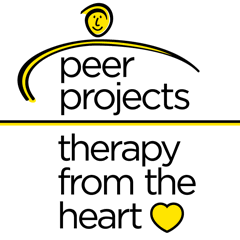Social Pragmatic Groups for Learners of All Ages
-
We support social learning with our clients using a relationship-based approach. As learners join a group, our goals are always to help them first and foremost build positive relationships with their peers, and walk away with positive memories of themselves as valuable communication partners and friends. We know that when these elements are our foundation, social learning opportunities naturally follow because the individuals are authentically invested in their connection to each other.
We will always honor who your learner is and what they bring to the group. We strive to highlight their special interests and incorporate their unique perspectives into their peer interactions.
As we facilitate play and communicative exchanges, we are always pulling from our foundational resources, Declarative Language Handbook and Co-Regulation Handbook, written by Linda Murphy, and work according to these Guiding Principles.
We use a range of activities when creating the landscape to support social connection. These may include traditional play opportunities such as turn-taking games, pretend play, gross motor play and sports, but we also use sensory or art projects, and authentic tasks and opportunities as they arise.
We frequently use reflection and planning ahead with our learners to help them feel connected to their peers, and to increase their ownership and personal agency within their group.
Our support of clients in groups is based on principles of and research in social-cognitive and social emotional development, and RDI, and is both neurodiversity affirming and trauma-informed.
We understand that everyone has a different social learning style, and our goal is always to support our learners in reaching their highest potential in their social communication, relationship building, and dynamic communication skills.
Example areas that we foster within groups include self-regulation, self-awareness, self-advocacy, social engagement, use of both verbal and nonverbal communication, resilience, perspective taking, flexibility, in the moment problem solving, and interoceptive awareness.
We know the pace of this growth is different for each learner. We meet clients where they are, and guide their learning and development from there, at a pace that is manageable to them.
-
After your phone intake, we would love to meet your learner for a social group intake. During this play-based, informal meeting, we will engage the learner in activities that interest them, maybe introduce a new activity or two, and have you complete a caregiver questionnaire, so you can share information related to your learner that we know we may not observe right away!
As we match individuals in a peer group, we are thinking about things such as age/grade, language skills, processing speed, group size, and play interests. We want to place your learner in a group where they are likely to form positive connections! We want to place them with peers that could potentially become their friends.
-
Here are a few example goals. Importantly goals are very individual, based on the learner.
-Client will increase their self-awareness around their own internal needs, emotions, and subsequent actions such that they learn personalized tools and strategies to support self-regulation, especially within in dynamic communication opportunities with peers.
-Client will respond to adult support and in-the-moment guidance (i.e., declarative language cues, reflecting on past interactions, sharing information about the bigger picture or intentions and perspective of others), for the purpose of supporting self-regulation, conflict management, self-advocacy and successful interpersonal communication.
-Client will demonstrate positive connections with peers as demonstrated by shared smiles, laughter and balanced interactions given faded adult support.
-Client will join in group activities while following rules and guidelines that have been discussed and agreed upon by the group, to maintain safety and positive interactions with peers.
-
Groups usually meet weekly for 1 hour. We currently run groups throughout the week, and on Saturdays.
We have several established groups that new clients may join.
We also are always creating new peer opportunities when we meet individuals who we think would be a good fit together, and schedules align!
-
Groups can be billed through your health insurance as speech language therapy, with co-pays, etc. due. We also accept private pay of $65 per session.
-
Yes to both! We run in person, virtual, and hybrid groups. As we meet your learner, we will determine together the best fit for them.
We like to think all of our groups, regardless of medium, are a lot of fun! And, they remain relationship-based, dynamic, individualized, and engaging for our clients.





